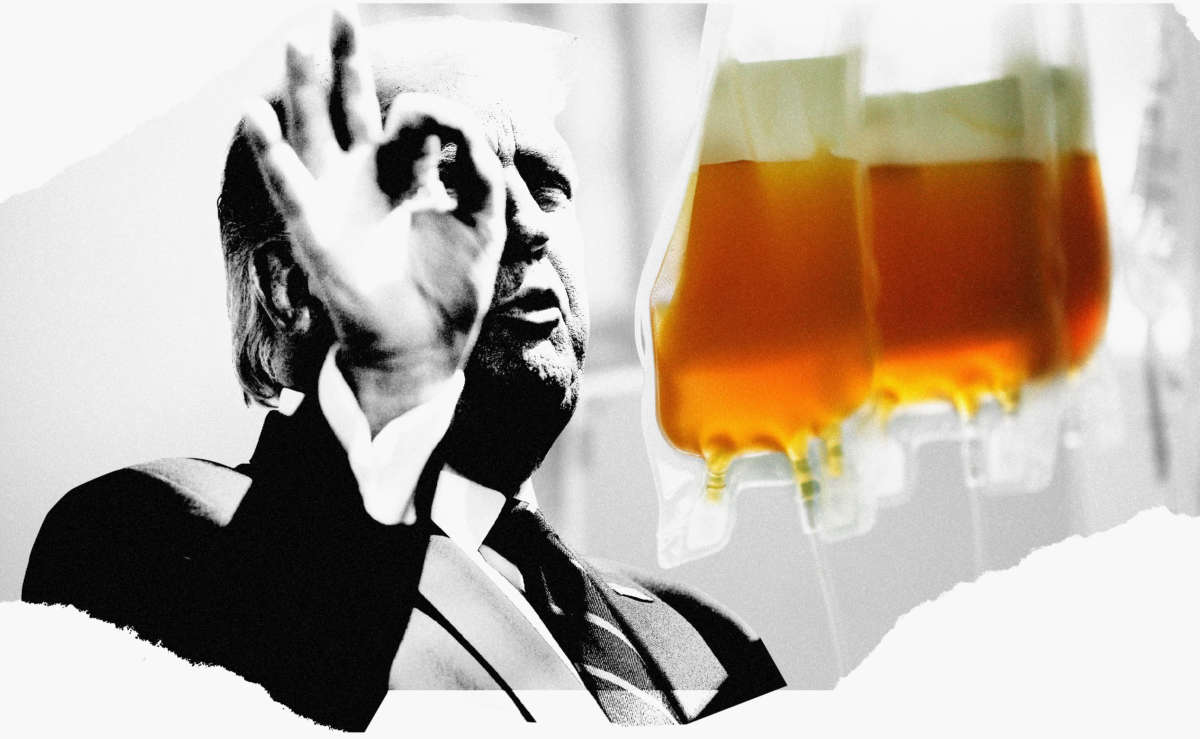A new report suggests President Donald Trump may push for an unproven vaccine for coronavirus from the United Kingdom to be made available in the United States just one month before voters are set to decide if he deserves another term in office.
The Financial Times reported on Monday that Democrats in Congress were briefed in July about the administration’s considerations for the vaccine, a person familiar with the meeting told the publication. According to the article, Speaker of the House Nancy Pelosi (D-California) tried to warn White House officials during that meeting that there couldn’t be any “cutting corners” with the vaccine if it could potentially be harmful to those who opt to get it.
Trump administration officials disputed the reporting, saying the fast-tracking of a vaccine for emergency use authorization isn’t being considered at this time.
A vaccine for COVID-19, touted by Trump as the answer to stopping the spread of coronavirus in the U.S., could indeed be an “October surprise” that would be beneficial to his reelection chances.
The president has struggled on the issue of how the American public perceives his handling of the pandemic, which has consistently been negative. Numbers from this week show that just 31 percent of Americans approve of how Trump has managed the crisis, while 68 percent disapprove, according to a recent Associated Press/NORC Center for Public Affairs Research poll released on Monday.
The British vaccine in question has seen some success in testing with a small sample of 1,000 patients. There have also been some documented side effects, however, and there’s no concluding evidence yet that the vaccine would be effective in preventing the spread of COVID-19.
The reporting from The Financial Times, if accurate, may showcase how frantic Trump is to find a cure or vaccine for coronavirus ahead of Election Day in November. The president has frequently promoted a number of treatments for the disease, touting them as being tremendous developments in the fight against its spread. However, many of the remedies he has promoted over the past few months have been questionable at best, and outright dangerous in some instances.
Earlier this week, Trump touted using convalescent plasma, where antibodies from the blood of a patient who has recovered from COVID-19 is transfused into a patient currently afflicted with it, as a “breakthrough” for treating the virus, after the Food and Drug Administration (FDA) permitted emergency use authorization for the treatment.
“This is a powerful therapy that transfuses very, very strong antibodies from the blood of recovered patients to help patients battling an infection,” Trump said in a statement at the White House on Sunday. “It’s had an incredible rate of success.”
Yet the high success rate Trump is suggesting is being questioned by health experts in the U.S. and around the world. The World Health Organization (WHO), for example, has noted that not enough research has been conducted to make such conclusive remarks.
“We recommend that convalescent plasma is still an experimental therapy. It should be evaluated in well-designed, randomized, clinical trials,” WHO’s chief scientist Soumya Swaminathan said, adding that there’s “very low-quality evidence” to say it’s as effective as Trump makes it out to be.
Thomas File, president of the Infectious Diseases Society of America, also urged caution when pushing the treatment.
“While the data to date show some positive signals that convalescent plasma can be helpful in treating individuals with COVID-19, especially if given early in the trajectory of disease, we lack the randomized controlled trial data we need to better understand its utility in COVID-19 treatment,” he recently said.
In promoting the treatment, the White House cited a study from the Mayo Clinic that suggested 35 percent of patients who received the convalescent plasma were more likely to survive another 30 days of coronavirus versus those who didn’t. However, that study noted its own limitations, including the lack of a placebo group with which to compare the findings.
The FDA has permitted a treatment promoted by Trump before — the malaria drug hydroxychloroquine — for emergency use, only to later strip that authorization after it was determined through a number of studies that use of the drug to treat coronavirus was ineffective, and what’s worse, potentially dangerous. In spite of their removing the emergency use authorization for the drug, Trump continued to peddle it, including weeks later when he tweeted a video that stated hydroxychloroquine was a “cure” for the disease.
Our most important fundraising appeal of the year
December is the most critical time of year for Truthout, because our nonprofit news is funded almost entirely by individual donations from readers like you. So before you navigate away, we ask that you take just a second to support Truthout with a tax-deductible donation.
This year is a little different. We are up against a far-reaching, wide-scale attack on press freedom coming from the Trump administration. 2025 was a year of frightening censorship, news industry corporate consolidation, and worsening financial conditions for progressive nonprofits across the board.
We can only resist Trump’s agenda by cultivating a strong base of support. The right-wing mediasphere is funded comfortably by billionaire owners and venture capitalist philanthropists. At Truthout, we have you.
We’ve set an ambitious target for our year-end campaign — a goal of $250,000 to keep up our fight against authoritarianism in 2026. Please take a meaningful action in this fight: make a one-time or monthly donation to Truthout before December 31. If you have the means, please dig deep.
